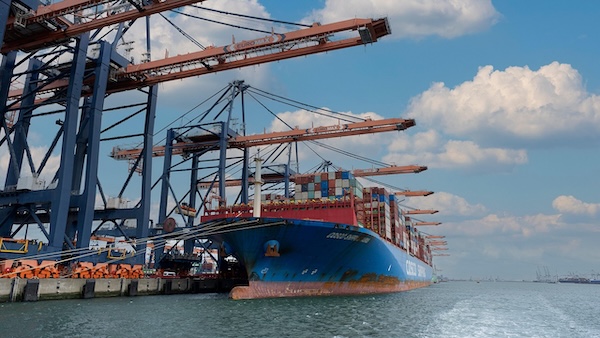 Trade ship;
Credit: Pixabay
Trade ship;
Credit: Pixabay
Growing up in Ukraine in the 1990s and 2000s, I became used to hearing warnings about gas price hikes, usually tied to tense negotiations with Russia, and this early exposure taught me that tariffs are rarely just about money, but more often about power.
This long-term exposure shaped a particular instinct: whenever I hear about tariffs or trade restrictions, I immediately associate them with economic leverage and dominance - often to the detriment of ordinary people.
Living in Luxembourg now, when I hear about US President Donald Trump's renewed plans to raise tariffs on imports, my first reaction is to consider the potential negative consequences for the Grand Duchy and the wider European Union. But let's take a closer look at what these tariffs are, how we got here, and what they might mean going forward.
In early 2025, President Trump returned to his signature tactic of economic pressure: tariffs. On 1 February 2025, his administration invoked emergency powers to justify sweeping import taxes on Canada, Mexico and China. Over the following months, Trump expanded tariffs dramatically - steel and aluminium imports faced 25% duties from mid-March, followed by a universal 10% import tariff introduced on 2 April 2025.
Particularly striking was Executive Order 14257, dubbed "Liberation Day," imposing retaliatory rates of up to 50% for dozens of countries - including key US allies in Europe.
In response, the European Union moved swiftly to defend its economic interests. European Commission President Ursula von der Leyen condemned the new tariffs as "a serious blow to the global economy," warning that Brussels would not hesitate to retaliate if negotiations failed within a 90-day window.
The EU promptly proposed a "zero-for-zero" deal: reduction of industrial tariffs on both sides, including cars, machinery and pharmaceuticals, conditional on mutual concessions. Simultaneously, Brussels prepared retaliatory tariffs covering approximately $21 billion worth of US imports, though those were temporarily delayed to allow for diplomatic resolution.
By late July 2025, an agreement was reached to cap US duties on key EU goods at 15%, down from the threatened 30-50%, while the EU suspended its own countermeasures for six months. While some claimed that von der Leyen had "caved in" to Trump's threats, Luxembourg, as part of the EU bloc, backed this unified approach and played an active role in trade negotiations and coordination.
For Luxembourg, this diplomatic breakthrough was crucial. As a small economy integrated into the single EU market, the country has limited insulation from trade policy shifts. The deal helped avert immediate harm to sectors such as steel, optics, financial services and industrial components - areas where Luxembourg either directly trades or is embedded in broader value chains.
Luxembourg's own Foreign Trade Minister, Xavier Bettel, described the tariffs as a lose-lose provocation. "Consumers on both sides of the Atlantic will pay the price for poor political decisions," he said, stressing that trade restrictions often disrupt supply chains and force companies to relocate production. "If you are weak, he eats you," Bettel added bluntly - emphasising that Europe must act with unity and resolve.
As of 1 August 2025, several of the new US tariffs have formally taken effect, marking a turning point in what many economists now describe as a slow-burning global trade standoff. While the EU and the US managed to reach a temporary agreement in late July, sparing some European sectors from the most severe duties, other major trading partners were less fortunate.
China responded swiftly, imposing counter-tariffs ranging from 15% to 125% on selected US goods, including agricultural exports and high-tech components. Canadian officials confirmed that Washington's 10% blanket tariff on imports from North America remained in force, leading Ottawa to file an official complaint with the World Trade Organization (WTO) and introduce limited retaliatory measures. Switzerland was hit with a 39% tariff rate, and President Trump has since come out to clarify that some sectors, including pharmaceuticals, will face much higher tariff rates...
The WTO has already scheduled a preliminary hearing for mid-September, following complaints lodged not only by Canada but also by several Asian economies. EU officials are reportedly coordinating with these partners in a broader effort to pressure Washington into revisiting what Brussels has called "non-compliant trade aggression."
Despite the partial EU-US agreement, Luxembourg's Ministry of the Economy reiterated concerns about lingering uncertainty. Local industries - particularly in machinery, optical instruments and steel - remain exposed to supply chain volatility. A report from Luxembourg's national statistics institute, STATEC, noted that export growth slowed in the second quarter of 2025, largely due to "external shocks linked to trade restrictions."
While EU counter-tariffs remain suspended under the July deal, some business associations in Luxembourg have called for a permanent framework to avoid cyclical disruptions.
Speaking to local media on Saturday 2 August 2025, FLTL (Luxembourg Federation of Transport and Logistics) President Carole Thill warned: "Short-term solutions are not enough. We need stable trade conditions - our members can't plan investments on a six-month horizon", referring to the need for businesses and investors to need stability and predictability rather than unknown variables, to be able to plan ahead.
Even as this agreement provides short-term stability, the broader implications of President Trump's tariff strategy continue to unfold. For countries like Luxembourg, which rely on open trade and integrated European value chains, even limited disruptions can have outsized effects.
The return of tariff diplomacy underscores a deeper shift in global economic relations - one in which trade policy is increasingly used as a geopolitical lever rather than a tool for mutual prosperity. For smaller economies, the challenge is not only to weather the immediate impact but also to contribute meaningfully to a coordinated and principled international response.
As the world watches for the next move from Washington, Brussels or Beijing, one lesson remains clear: economic resilience today depends as much on diplomatic agility as it does on financial or industrial strength.









